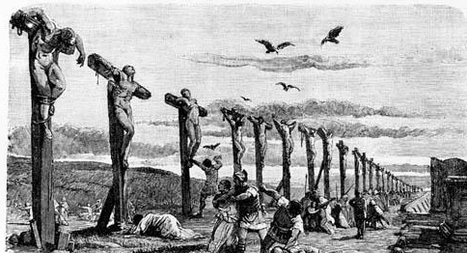|
By: Drew Hart Note: This article originally appeared on The Christian Century  As we reflect on what we so casually refer to as Good Friday, we are called to remember and reflect on the significance of Jesus’ death, which itself has a contested meaning in the Church. Some of the challenges around the meaning of Jesus’ death is related to the way his death is divorced from the narratives of his life. Jesus’ death is often placed in a context-free vacuum, in which it is only about our forgiveness of sins (carried out through divine contract). Such abstractions willfully choose to not read Jesus’ death in the context of his life. The political confrontation, the power-dynamics, the concerns of the masses, the subversive implications of the narrative’s plot, and the inherent judgment of Yahweh that came and judged the injustice and idolatry of the Jerusalem establishment which is echoed through the use of Israel’s prophetic texts, are all made invisible in the Jesus stories. All of this leads up to, and interprets, Jesus’ death. However, according to Luke’s narration, the earliest followers of Jesus understood his death as something done by the socio-political players of his day: “our chief priests and rulers handed him over to be condemned to death, and crucified him.” (Luke 24:20, NET) We are given even more in Acts when Peter summarizes Jesus’ life, death, and resurrection like this: You know the message he sent to the people of Israel, proclaiming the good news of peace through Jesus Christ (he is Lord of all) – you know what happened throughout Judea, beginning from Galilee after the baptism that John announced: with respect to Jesus from Nazareth, that God anointed him with the Holy Spirit and with power. He went around doing good and healing all who were oppressed by the devil, because God was with him. We are witnesses of all the things he did both in Judea and in Jerusalem. They killed him by hanging him on a tree, but God raised him up on the third day and caused him to be seen. (Acts 10:36-40)[1] Reading Jesus’ death without disconnecting it from his life and teachings, (or his resurrection) unveils to us the realities of hierarchical power that engaged in targeted and precise violence against Jesus’ body in an effort to crush the messianic reign of God that began to emerge subversively from below and within their jurisdiction, threatening to undermine their “lording over others”. The only response such hierarchical and evil power knows is to stigmatize and punish a body publicly, making an example out of someone to keep the whole populace in place. This practice of retaining supremacy over others in reality is ugly and gruesome. By disconnecting forgiveness of sins from the death-dealing practices attached to social hierarchy, and all the monstrous practices that are employed to actually keep it, leave us unchallenged by the way of Jesus which points us (through his life, death, and resurrection) towards the new humanity that renounces such social patterns and vicious cycles. If we are going to reflect on the death of Jesus for Good Friday, then we must also consider the contradictions of whitened Christianity that has for centuries practiced and permitted the limitless violence against black bodies while clinging simultaneously to the old rugged cross. James Cone was right, we must remember the lynched black body if we are to make sense of Jesus’ body that was hung on a tree by the powers that be in his own day. Here is one such reminder. Here we find Douglas Blackmon describing the lynching of David Wyatt in vivid detail, which assists in revealing the hypocrisies of whitened Christian Civil Religion that continues to justify its own apathy and self-projections of innocence amidst anti-black terrorism against black bodies: Dragged into the street, the mob surged around him, kicking and stomping his body until it was matted in blood and dirt. A rope was secured to his neck and tossed to two men who climbed a telegraph pole. Hoisted just a few feet off the ground, Wyatt's body whipped back and forth as members of the crowd gouged, stabbed, and sliced his torso, legs, and arms with knives. Others in the mob gathered pickets from nearby fences and roadside signs to build a crude pyre beneath his dangling corpse. Still more went for gasoline and benzene. Soon Wyatt's body was engulfed in flame. By the time the earliest churchgoers left their homes on Sunday, June 7, the grotesque form of Wyatt's carbonized remains lay amid a heap of ashes and smoldering wood on the street.[2] May we not domesticate the Jesus story for our own religious comfort, but in telling the story, and doing so truthfully, may we worship our crucified Christ and encounter his delivering presence, and therefore be transformed after the image of God. Notes:
Comments
|
Disclaimer
The viewpoints expressed in each reader-submitted article are the authors own, and not an “official Jesus Radicals” position. For more on our editorial policies, visit our submissions page. If you want to contact an author or you have questions, suggestions, or concerns, please contact us. CategoriesAll Accountability Advent Anarchism Animal Liberation Anthropocentrism Appropriation Biblical Exegesis Book Reviews Bread Capitalism Catholic Worker Christmas Civilization Community Complicity Confessing Cultural Hegemony Decolonization Direct Action Easter Economics Feminism Heteropatriarchy Immigration Imperialism Intersectionality Jesus Justice Lent Liberation Theology Love Mutual Liberation Nation-state Nonviolence Occupy Othering Pacifisim Peace Pedagogies Of Liberation Police Privilege Property Queer Racism Resistance Resurrection Sexuality Solidarity Speciesism Spiritual Practices Technology Temptation Veganism Violence War What We're Reading On . . . White Supremacy Zionism ContributorsNekeisha Alayna Alexis
Amaryah Armstrong Autumn Brown HH Brownsmith Jarrod Cochran Chelsea Collonge Keith Hebden Ric Hudgens Liza Minno Bloom Jocelyn Perry Eda Ruhiye Uca Joanna Shenk Nichola Torbett Mark VanSteenwyk Gregory Williams Archives
October 2017
|
Search by typing & pressing enter


 RSS Feed
RSS Feed